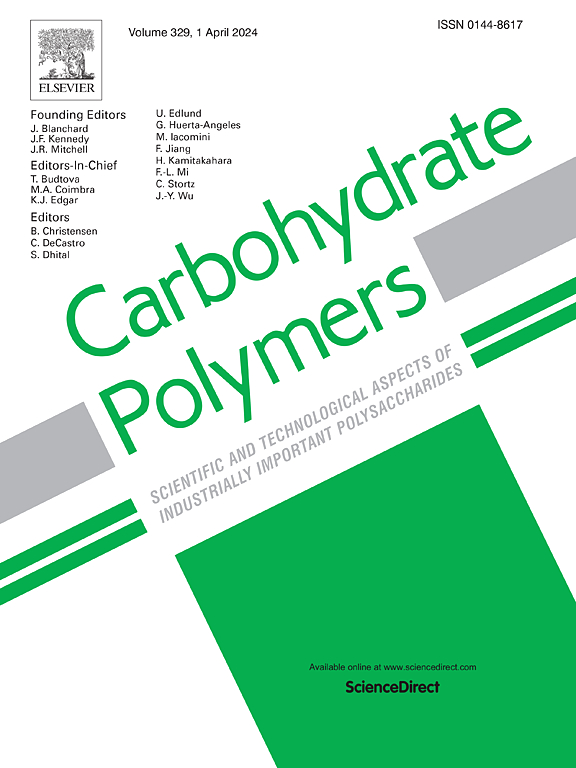创新的双功能、绿色、可生物降解的二羧基菊粉可作为可持续油气作业的阻垢和腐蚀抑制剂
IF 10.7
1区 化学
Q1 CHEMISTRY, APPLIED
引用次数: 0
摘要
油气行业迫切需要更环保、更智能的解决方案来应对无机结垢和金属基础设施腐蚀的双重挑战。在这项工作中,我们介绍了一种新型的,双功能的,无磷的腐蚀和阻垢剂,来源于菊粉的原位二羧基化,通过环境友好的两步氧化策略。FT-IR和1H NMR证实,菊粉通过选择性高碘酸钠氧化和Pinnick氧化,有效地转化为高度功能化的二羧基生物聚合物,同时保持其主链结构的完整性。电化学阻抗谱(EIS)显示,二羧基菊粉在碳钢表面形成了一层弹性保护膜,吸附行为符合Langmuir等温线,吸附速率ΔG°ads为- 39.32 kJ·mol - 1,表明在100 ppm时,二羧基菊粉的化学吸附与物理吸附相结合,缓蚀效率为94.5%。有趣的是,根据NACE标准TM0374-2007方案,所得的二羧基菊粉在低抑制剂浓度下对石膏垢表现出优异的抑制性能。此外,在相同的测试浓度下,它对方解石结垢的抑制效率达到90%,优于市售的羧甲基菊粉。二羧基菊粉在高钙盐水条件下也表现出出色的相容性,即使抑制剂剂量高达10,000 ppm也能保持性能。本文章由计算机程序翻译,如有差异,请以英文原文为准。

Innovative dual-functional, green and biodegradable dicarboxylated inulin as scale and corrosion inhibitors for sustainable oil and gas operations
The oil and gas industry urgently needs greener, smarter solutions to combat the dual challenges of inorganic scale formation and corrosion of metallic infrastructure. In this work, we introduce a novel, dual-functional, phosphorus-free corrosion and scale inhibitor derived from the in situ dicarboxylation of inulin through an environmentally benign two-step oxidation strategy. Inulin was efficiently converted into a highly functionalized dicarboxylated biopolymer through a selective sodium periodate oxidation followed by Pinnick oxidation, while maintaining the integrity of its backbone structure, as confirmed by FT-IR and 1H NMR spectroscopy. The dicarboxylated inulin formed a resilient, protective film on carbon steel surfaces, as revealed by electrochemical impedance spectroscopy (EIS), with adsorption behavior fitting the Langmuir isotherm and a ΔG°ads of −39.32 kJ·mol−1, highlighting a strong chemisorption process supplemented by physisorption with corrosion inhibition efficiency of 94.5 % at 100 ppm. Interestingly, the resulting dicarboxylated inulin exhibited excellent inhibition performance against gypsum scale at low inhibitor concentrations, following the NACE Standard TM0374–2007 protocol. Additionally, it demonstrated a remarkable 90 % inhibition efficiency against calcite scaling, outperforming commercially available carboxymethyl inulin at the same tested concentration. The dicarboxylated inulin also showcased outstanding compatibility under high‑calcium brine conditions, maintaining performance even at inhibitor dosages up to 10,000 ppm.
求助全文
通过发布文献求助,成功后即可免费获取论文全文。
去求助
来源期刊

Carbohydrate Polymers
化学-高分子科学
CiteScore
22.40
自引率
8.00%
发文量
1286
审稿时长
47 days
期刊介绍:
Carbohydrate Polymers stands as a prominent journal in the glycoscience field, dedicated to exploring and harnessing the potential of polysaccharides with applications spanning bioenergy, bioplastics, biomaterials, biorefining, chemistry, drug delivery, food, health, nanotechnology, packaging, paper, pharmaceuticals, medicine, oil recovery, textiles, tissue engineering, wood, and various aspects of glycoscience.
The journal emphasizes the central role of well-characterized carbohydrate polymers, highlighting their significance as the primary focus rather than a peripheral topic. Each paper must prominently feature at least one named carbohydrate polymer, evident in both citation and title, with a commitment to innovative research that advances scientific knowledge.
 求助内容:
求助内容: 应助结果提醒方式:
应助结果提醒方式:


